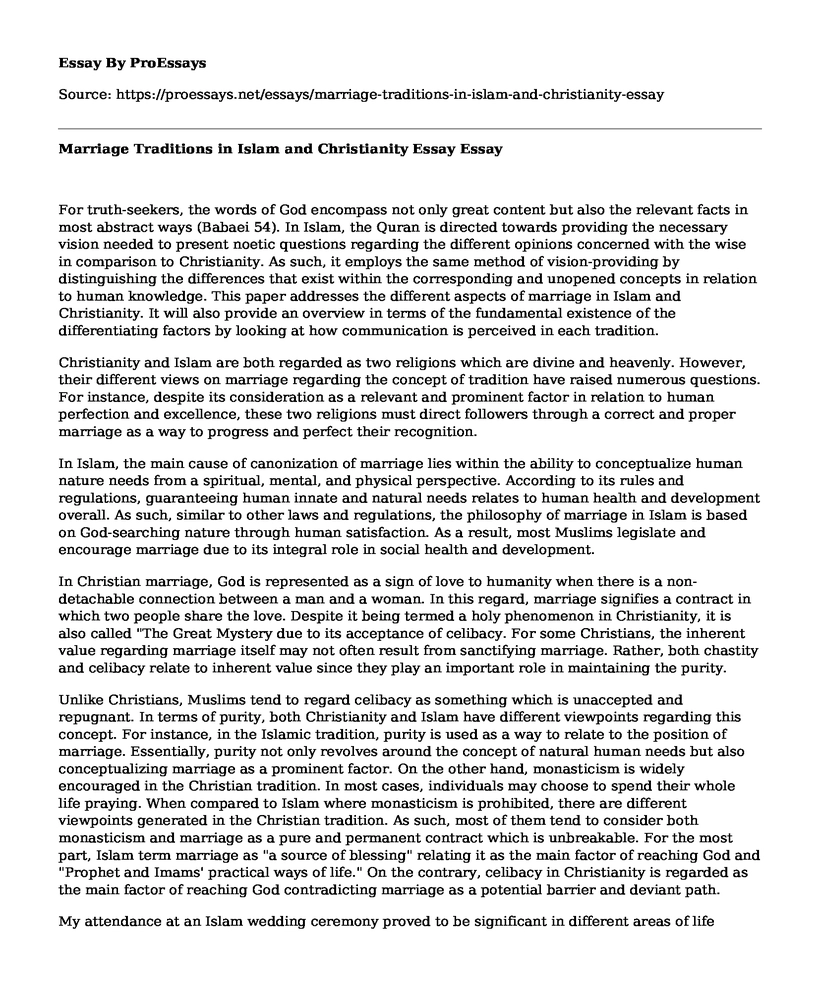For truth-seekers, the words of God encompass not only great content but also the relevant facts in most abstract ways (Babaei 54). In Islam, the Quran is directed towards providing the necessary vision needed to present noetic questions regarding the different opinions concerned with the wise in comparison to Christianity. As such, it employs the same method of vision-providing by distinguishing the differences that exist within the corresponding and unopened concepts in relation to human knowledge. This paper addresses the different aspects of marriage in Islam and Christianity. It will also provide an overview in terms of the fundamental existence of the differentiating factors by looking at how communication is perceived in each tradition.
Christianity and Islam are both regarded as two religions which are divine and heavenly. However, their different views on marriage regarding the concept of tradition have raised numerous questions. For instance, despite its consideration as a relevant and prominent factor in relation to human perfection and excellence, these two religions must direct followers through a correct and proper marriage as a way to progress and perfect their recognition.
In Islam, the main cause of canonization of marriage lies within the ability to conceptualize human nature needs from a spiritual, mental, and physical perspective. According to its rules and regulations, guaranteeing human innate and natural needs relates to human health and development overall. As such, similar to other laws and regulations, the philosophy of marriage in Islam is based on God-searching nature through human satisfaction. As a result, most Muslims legislate and encourage marriage due to its integral role in social health and development.
In Christian marriage, God is represented as a sign of love to humanity when there is a non-detachable connection between a man and a woman. In this regard, marriage signifies a contract in which two people share the love. Despite it being termed a holy phenomenon in Christianity, it is also called "The Great Mystery due to its acceptance of celibacy. For some Christians, the inherent value regarding marriage itself may not often result from sanctifying marriage. Rather, both chastity and celibacy relate to inherent value since they play an important role in maintaining the purity.
Unlike Christians, Muslims tend to regard celibacy as something which is unaccepted and repugnant. In terms of purity, both Christianity and Islam have different viewpoints regarding this concept. For instance, in the Islamic tradition, purity is used as a way to relate to the position of marriage. Essentially, purity not only revolves around the concept of natural human needs but also conceptualizing marriage as a prominent factor. On the other hand, monasticism is widely encouraged in the Christian tradition. In most cases, individuals may choose to spend their whole life praying. When compared to Islam where monasticism is prohibited, there are different viewpoints generated in the Christian tradition. As such, most of them tend to consider both monasticism and marriage as a pure and permanent contract which is unbreakable. For the most part, Islam term marriage as "a source of blessing" relating it as the main factor of reaching God and "Prophet and Imams' practical ways of life." On the contrary, celibacy in Christianity is regarded as the main factor of reaching God contradicting marriage as a potential barrier and deviant path.
My attendance at an Islam wedding ceremony proved to be significant in different areas of life regarding communication. For instance, the requirements for Muslim wedding practices differ in relation to culture, Islamic sets as well as adherence to gender separation rules. Furthermore, most marriages are often held outside mosques where both men and women are separated during the initiation of the ceremony and reception. In the Islamic tradition, no official clergy is prevalent. As such, ceremonies may be conducted by any Muslim who is aware of these sanctions. In most cases, they deploy officers known as qazi or madhun.
In my recent engagement with a qazi, communication mostly revolved the concept of Meher, a formal statement relating to the monetary amount the bride receives from the groom (Mayer 215). My reaction was unique, especially when considering this was a different tradition with unique values and cultural beliefs. Although the conversation was mostly based on passive communication behavior, certain factors proved to be relevant. For instance, unlike today's society where most couples use the ring as a symbol of commitment, a Meher is involved with two significant parts. First, the marriage is consummated with a prompt, and then the bride is given a deferred amount. Also, in Islam, the marriage contract is represented in a nikah ceremony. Hence, the bride and groom commit by repeating the word qabul which means "I accept" three times. The vows and blessings are conducted through recitations of the Fatihah which is the first chapter of the Quran and durud (blessings) following an additional religious ceremony. Recitation of vows is not allowed for Muslim couples. Nevertheless, their officials are the ones who speak about the significance of marriage as well as how their responsibilities are related to each other and Allah.
Works Cited
Babaei, Rahmatollah. "The Comparative Study of the Marriage in Islam and Christianity." pp. 54-59,
Mayer, Ann Elizabeth. Islam and human rights: tradition and politics. Hachette UK, 2012. 215-321
Cite this page
Marriage Traditions in Islam and Christianity Essay. (2022, Sep 22). Retrieved from https://proessays.net/essays/marriage-traditions-in-islam-and-christianity-essay
If you are the original author of this essay and no longer wish to have it published on the ProEssays website, please click below to request its removal:
- The Process and Concept of Canonization
- Is it Ethical to Engage in Office Gossip? HRM Essay Example
- Economic Class Status Effect to Success Essay Example
- The Principles Embodied in the Quranic Worldview Paper Example
- Baby Boomers: The Largest Generation in the World - Essay Sample
- Paper Example on Abortion: A Conundrum of Contention
- Reducing Expenses & Increasing Profits: Companies Adopt SCADA Operation for Business Networking - Paper Sample







